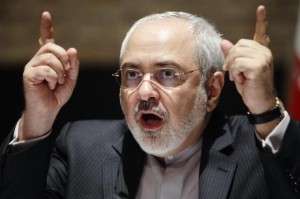
Iranian Foreign Minister Mohammad Javad Zarif addresses the media during a news conference in Vienna July 15, 2014.
Credit: Reuters/Heinz-Peter Bader
UNITED NATIONS
(Reuters) – A diplomatic breakthrough is unlikely on a nuclear deal to end sanctions against Iran when talks resume in New York this week between Tehran and six world powers deadlocked after a year of negotiations.
The talks between Iran and the United States, Britain, France, Germany, Russia and China are re-starting after a two-month hiatus and amid Washington and Tehran ruling out cooperation on fighting Islamic State militants who have taken over swaths of Iraq and Syria.
Iranian Foreign Minister Mohammad Javad Zarif and European Union foreign policy chief Catherine Ashton will discuss the negotiations on a long-term nuclear deal over lunch on Thursday, diplomats said. The EU has been a kind of interlocutor for the six powers.
Diplomats from the six countries will begin meeting among themselves on Thursday before they all sit down with the Iranian delegation on Friday. The negotiations are expected to run until at least Sept. 26 on the sidelines of next week’s annual gathering of world leaders at the United Nations General Assembly.
Ahead of the formal negotiations, U.S. Deputy Secretary of State William J. Burns and Under Secretary of State for Political Affairs Wendy Sherman – the number 2 and 3 diplomats at the State Department – will hold bilateral talks with Iranian officials on Thursday and Friday, the State Department said.
“The talks are going to be on the nuclear issue. At times other topics have come up on the sidelines, but that’s not the purpose or the intent, as is always the case,” a U.S. official said on condition of anonymity about the bilateral talks.
U.S. and Iranian officials discussed the crisis in Iraq on the sidelines of the Vienna nuclear talks in June, though they have ruled out cooperating with each other on dealing with the threat posed by Islamic State in the region.
Sherman, who heads the U.S. delegation, said in a speech at Georgetown University on Tuesday that more movement from Iran will be needed to secure a long-term agreement.
“We can say on the positive side that our talks have been serious and that we have identified potential answers to some key questions,” Sherman said. She also said “we remain far apart on other core issues, including the size and scope of Iran’s uranium enrichment capacity.”
Iran denies Western allegations that it is refining uranium to develop the capability to assemble nuclear weapons, saying it is doing it to help generate electricity.
The United States and its allies have in recent years imposed ever tighter financial and others sanctions on Iran, a major oil producer, to make it scale back its nuclear program.
CENTRIFUGE CAPACITY
Western governments want Iran to have a centrifuge capacity in the low, single-digit thousands so that it would take Tehran a long time to use the machines to purify enough uranium to fuel an atomic weapon. Tehran has rejected demands to significantly reduce the number below the more than 19,000 it has now installed, of which roughly half are operating.
Zarif, speaking at the Council on Foreign Relations in New York, complained about what he described as unreasonable demands by Western powers in the nuclear talks but added that Tehran was committed to resolving the decade-long nuclear stand.
“We are committed to resolving this issue, we want to resolve this issue,” he said, though he said later that Iran is “totally distrustful of the United States”.
Iran, diplomats close to the talks said, appears unwilling to reduce the number of its centrifuges to below 10,000.
But that would be an unacceptable for the six powers, who diplomats say are aiming to have a deal in place that leaves Iran in a position where it would need at least one year to produce enough high enriched uranium for a single bomb – the so-called “breakout” capacity.
“On the question of enrichment we have practically made no progress,” a senior Western diplomat said. “The six want that in case the agreement is broken and the nuclear activities restart towards a military objective, that we have a breakout capacity of a year.”
Diplomats said a breakthrough in the New York negotiations was unlikely.
“Things remain blocked,” the senior Western diplomat said. “New York will be vital to see if we can break the impasse.”
Depending on how the negotiations among senior foreign ministry officials go in the coming days, another Western diplomat said foreign ministers might join the talks late next week “if good progress is being made or if there’s a blockage.”
Talks between Iran and the six were formally started during last year’s General Assembly, when Zarif and U.S. Secretary of State John Kerry sat side-by-side during a special side meeting. Last November in Geneva, Iran and the six reached an interim agreement under which Tehran won some easing of sanctions in return for halting its most sensitive nuclear work.
But they failed to meet a July 20 target for a comprehensive agreement under which Iran would further curb its atomic activities in exchange for a gradual lifting of sanctions, and they set a new deadline of Nov. 24.
(Additional reporting by Michelle Nichols at the United Nations, Lesley Wroughton and Arshad Mohammed in Washington, Luke Baker in Jerusalem and John Irish in Paris; Editing by Grant McCool and Andrew Hay)







